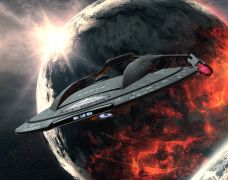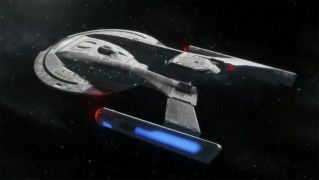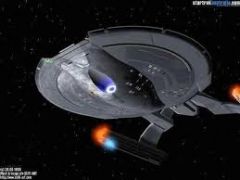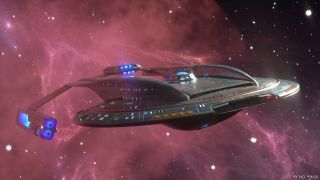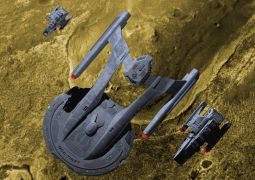Akira Class: Difference between revisions
More actions
No edit summary |
No edit summary |
||
| Line 107: | Line 107: | ||
=Images= | =Images= | ||
<gallery mode="packed" class="center"> | <gallery mode="packed" class="center"> | ||
File:Akira1.jpg | File:Akira1.jpg|Fore view | ||
File:Akira2.jpg | File:Akira2.jpg|Port view | ||
File:Akira3.jpg | File:Akira3.jpg|Ventral View | ||
File:Akira4.jpg | File:Akira4.jpg|Akira Class | ||
File:Akira5.jpg | File:Akira5.jpg|Akira class flanked by runabouts | ||
</gallery> | </gallery> | ||
Revision as of 22:56, 30 August 2019

| |
| Akira-class | |
| Class Information | |
| Role: | Heavy Cruiser / Light Carrier |
| Status: | |
| Date Entered Service: |
2363 |
| Basic Stats | |
| Decks: |
|
| Cruising Speed: |
Warp 7 |
| Total Compliment: |
530 |
| Tactical Systems | |
| Energy Weapons: | |
| Torpedo Launchers: |
15 Launchers |
| Shields: | |
Class Description
Class Design Brief
While the Akira class follows the standard primary hull, secondary hull, twin nacelle arrangement seen in the majority of Starfleet ship classes the way these elements has been arranged is truly unique. The secondary hull was catamaran design that blended into the dorsal surface of the primary hull on each side of the bridge module. This layout provides an extra measure of protection to the ship's bridge. A set support pylon extends up and forward from the aft end of the catamaran's to support a weapons pod above the secondary hull so that it is centered along the ship's center line.
The Akira class is equipped with four impulse engines. The first set is located on the aft end of the primary hull just outboard of each catamaran. The second set is located in the secondary hull with one engine at the very aft end of each catamaran. The warp nacelles are held on each side of the ventral section of the primary hull on pylons that extend down and aft from the aft end of each of the catamaran's just forward of the impulse engines.
Another special feature of the Akira class is the hangar bay arrangements. There are two large shuttle bays in the saucer section, one at the forward edge of the saucer section and one at the rear. These allow large numbers of launch and landing operations to be handled simultaneously.
Like many ships in Starfleet the Akira class is capable of carrying out mission of exploration and discovery. To this end ships of the Akira class are equipped with a wide array of sensors along with both medical and science labs. The majority of the sensor systems are housed in lateral arrays around the edge of the primary hull with a suite of long range sensors housed behind the ship's deflector dish.
Ships of the Akira class are also very capable in combat situations. These ships are equipped with only three phaser Type X Phaser arrays one dorsally mounted and the other two ventrally mounted to the primary hull. There are a total of fifteen torpedo launchers. There are four forward and six aft facing torpedo launchers mounted in the weapons pod. There are two port facing and two starboard facing launchers mounted in the dorsal section of the primary hull. The final torpedo launcher is mounted facing forward just below the deflector dish. To protect the vessel from enemy fire or other hazards the ship might face ships of the Akira class is equipped with multi-layered shields.
Class Service History
In 2354 the Antares Ship Yards submitted a unique ship design to the Advanced Starship Design Bureau, this design was the USS Akira. At first the design confused the members of the Bureau as they could not agree if just what this ship was supposed to be, was is an explorer, a gun ship, or a carrier? The USS Akira combined elements of all three and after a two month review the Bureau returned the design back to the Antares Ship Yards with a request to simplify the design. The ship yards made several minor design changes and resubmitted what was basically the original design. At the same time they shipyards began a major campaign in support of their ship eventually getting the Design Bureau to back the construction of the USS Akira. Having received the green light the ship yards began construction of the USS Akira in 2358.
Construction was completed in 2360 and the Akira was launched for a shake down cruise. During the Two years it had taken to construct the Akira support for the ship had waned and the ASDB was looking at only a limited run of what was considered the oddest ship in the fleet. During the sake down cruise design flaws in the loading system for the torpedo launchers was discovered along with instabilities in the warp filed at speeds greater than warp 5.4 due to the unique catamaran design of the secondary hull. After only four months since leaving the Antares system the Akira returned to dry dock to deal with the problems uncovered during the shake down cruise. It was at this time that the Akira project was almost canceled but when the engineers at the Antares Ship Yards was able to propose modifications that would deal with the issues the project was allowed to continue. The Akira was once more launched in 2362 for a second shake down and with the issues dealt with the ship quickly passed all systems tests and was fully commissioned in 2363.
As more ships of the Akira class were put into service the ships won over those assigned to crew them. In 2366 the first run of Akira Class ships was nearing completion when the battle of Wolf 359 occurred. With Starfleet on the losing end of a battle where they lost almost forty ships with out inflicting serious dame to the single Borg Cube the decision was made by the top brass to increase the combat capabilities of the fleet. One way this was done was that more Akira Class ships were ordered not only to replace the ships destroyed by the Borg but to replace ships that were nearing the end of their service life.
Ships of the Akira class easily slipped in to the role of explorer where the large number of auxiliary craft it could carry meant that missions such as system mapping could be quickly carried out. During this time the Akira class ships proved to be excellent explorers but the chance to prove their combat capabilities would have to wait until 2373. During that year the Federation had to deal with the outbreak of The Dominion War and the second Borg incursion. In both instances the Akira class proved to be as capable during times of strife as it was in times of peace.
Three ships of the Akira class took part in the Battle of Sector 001 that resulted in the destruction of the attacking Borg Cube. The Dominion War saw Starfleet suffer significant losses leading to the Akira class to taking on a larger portion of the combat missions. As Starfleet losses mounted more ships of the Akira class were built and soon it was normal to see multiple ships of the Akira Class during fleet operations. The fact that the Akira class could be quickly built and could carry twenty fighters into combat made it a favorite ship of Starfleet Command and more were built to replace war time losses.
After the war the Akira class returned to peace time operations but they stood ready to be pressed into combat operations if so needed. Today nearly two decades after the commissioning of the USS Akira and only one quarter into the expected life span of the USS Akira the ships of this class can be seen an almost every corner of the Federation and have even been tasked with exploring beyond Federation borders. The ship that confused the ASDB no longer confuses people and when people think of Starfleet on of the ships they envision is the Akira class.
Construction of ships of the Akira Class was slowed in 2379 and the last Akira class to be built was launched in 2381. While no ship of this class are currently under construction Starfleet reserves the right to order the construction of more ships of this class if necessary. The Akira Class ships continue to serve Starfleet well and there is no plans to retire the class until at least the mid 2400's.
Ship Specifications
| Specifications | |||
|---|---|---|---|
| Basic Information |
|
Crew Complement |
|
| Propulsion |
|
Offensive Systems |
ENERGY WEAPONS TORPEDO LAUNCHERS
PAYLOAD
|
| Defensive Systems |
|
Primary Systems |
|
| Auxiliary Craft |
SHUTTLEBAYS:
SUPPORT CRAFT:
|
Other |
CREW AMENITIES:
STARSHIP FEATURES:
|
| Notes | |||
Images
-
Fore view
-
Port view
-
Ventral View
-
Akira Class
-
Akira class flanked by runabouts
Deck Listing
Weapons Pod (By transporter only
| Deck | Details | Deck | Details |
|---|---|---|---|
| A Deck |
|
B Deck |
|
| C Deck |
|
Deck |
|
Main Hull
| Deck | Details | Deck | Details |
|---|---|---|---|
| Deck 1 |
|
Deck 2 |
|
| Deck 3 |
|
Deck 4 |
|
| Deck 5 |
|
Deck 6 |
|
| Deck 7 |
|
Deck 8 |
|
| Deck 9 |
|
Deck 10 |
|
| Deck 11 |
|
Deck 12 |
|
| Deck 13 |
|
Deck 14 |
|
| Deck 15 |
|
Deck 16 |
|
| Deck 17 |
|
|
| Federation Ship & Station Classes | |
|---|---|
| Starships | • Akira Class • Antares Class • Century Class • Defiant Class • Galaxy Class • Insignia Class • Luna Class • Nebula Class • Nova Class • Prometheus Class • Saber Class • Steamrunner Class • Sovereign Class • Vesta Class • |
| Starbases | • Argus Class • Aurora Class • Regula Class • Sigma Class • Spacedock Class • |
| Support Craft | Shuttles • Type 8 Shuttle • Type 9 Shuttle • Type 11 Shuttle • Type 15 Shuttlepod • Runabouts • Argo Class • Danube Class • Fighters • Gryphon Class • Other • Workbee • |
Use of Bravo Fleet's Akira Class is used under the Creative Commons 4.0 License and may have been modified for AioRPG.

